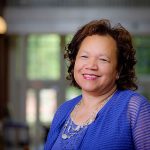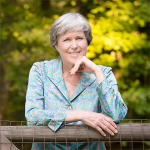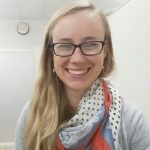Wanda Brown
 I see the role of sustainability as critical to our organization. As an information association, we are the voice to our profession. We have to be the link between what we want our libraries to model as well as the educator and training around current relevant topics. I see the Sustainability round table as the primary developer of guiding principles and the facilitator of outreach programs that encourage sustainability efforts within libraries. Your mission is to educate, inform and connect. I see your round table as the driving force for developing and sharing of values and initiating programs that can be replicated throughout any and all libraries. The task of educating is a revolving door that never closes.
I see the role of sustainability as critical to our organization. As an information association, we are the voice to our profession. We have to be the link between what we want our libraries to model as well as the educator and training around current relevant topics. I see the Sustainability round table as the primary developer of guiding principles and the facilitator of outreach programs that encourage sustainability efforts within libraries. Your mission is to educate, inform and connect. I see your round table as the driving force for developing and sharing of values and initiating programs that can be replicated throughout any and all libraries. The task of educating is a revolving door that never closes.
As President of ALA I will definitely support the work of the round table. Collaboration remains the key for us in educating our communities. Combining forces with other affiliates will increase the number of people we reach. In keeping with the theme of “Libraries Lead” perhaps we could launch a state by state campaign of planned events around sustainability education. The communities we serve are still not as knowledgeable as we’d like around the issues of environmental and economic consequences associated with our actions. Not only partnering with other divisions of ALA, we also encourage libraries to collaborate with other community groups. We could launch a national day/week of collaborative programming within each county.
Peter Hepburn
 Sustainability is relevant to the entirety of ALA. There is not one of us – member or staff – who is not touched in some way by what sustainability means. Whether we define it in terms of environmentally responsible practices, or we think of it more broadly in terms of how ALA manages and maintains its many assets, the concept should matter to us all. We see this in our libraries already. As my campaign site (https://www.peterforala.org/) declares, “Libraries sustain our communities and institutions”. They serve as models and resources for sustainable practices. ALA can provide the space for exchange of ideas such that more and more libraries adopt and further disseminate those practices.
Sustainability is relevant to the entirety of ALA. There is not one of us – member or staff – who is not touched in some way by what sustainability means. Whether we define it in terms of environmentally responsible practices, or we think of it more broadly in terms of how ALA manages and maintains its many assets, the concept should matter to us all. We see this in our libraries already. As my campaign site (https://www.peterforala.org/) declares, “Libraries sustain our communities and institutions”. They serve as models and resources for sustainable practices. ALA can provide the space for exchange of ideas such that more and more libraries adopt and further disseminate those practices.
Sustainability of and within ALA is a priority for my presidency. I eagerly await the report of the Task Force on Sustainability, and I will focus on ensuring its recommendations come to fruition. I also want to facilitate collaboration and cooperation across the various ALA units so that work on sustainability will be shared. SustainRT could be a partner for so many others – think of how it could contribute to divisional conferences, or how it could develop programs and tools with any other round table – and as president, I want to encourage those partnerships as much as possible.
I learned a lot from SustainRT (and joined it!) in my three years as its Executive Board liaison, and I am keen that the interests of the round table become the interests of the association as a whole.



 Sarah Klimek recently began working as the U.S. History Librarian at Michigan State University. She received her M.L.S. from Indiana University in May 2017, where she worked as a Public Services Assistant and a Teaching & Learning Graduate Assistant at the Herman B Wells Library. Prior to her M.L.S., she received a B.A. in history with a certificate in early childhood education from University of Maryland, Baltimore County. As an early-career librarian, Sarah is dedicated to supporting the growth of resilient and sustainable communities – she is a member of SustainRT and recently published an article on the availability of government information on sustainability in the Winter 2016 issue of
Sarah Klimek recently began working as the U.S. History Librarian at Michigan State University. She received her M.L.S. from Indiana University in May 2017, where she worked as a Public Services Assistant and a Teaching & Learning Graduate Assistant at the Herman B Wells Library. Prior to her M.L.S., she received a B.A. in history with a certificate in early childhood education from University of Maryland, Baltimore County. As an early-career librarian, Sarah is dedicated to supporting the growth of resilient and sustainable communities – she is a member of SustainRT and recently published an article on the availability of government information on sustainability in the Winter 2016 issue of